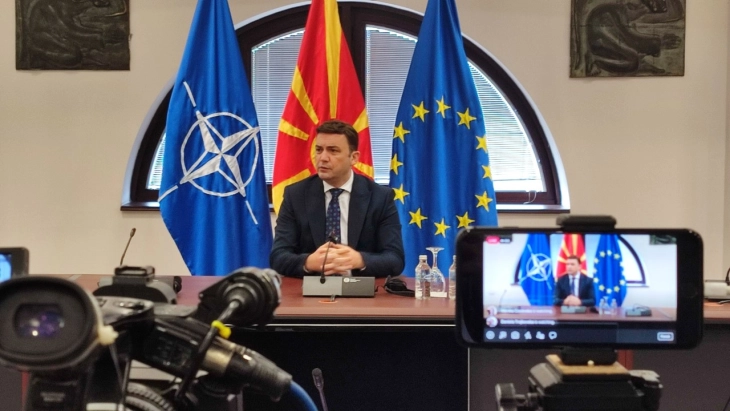More wisdom rather than emotion needed, Osmani says on talks with Bulgaria

Skopje, 13 February 2022 (MIA) – Foreign Minister Bujar Osmani during a press briefing on Sunday commented on the meetings, talks and communication over the past week in terms of the new dynamics in the negotiations with Bulgaria.
According to Osmani, as part of such new dynamics with Bulgaria, the fourth working group on education and culture, as well as the third working group on European integration, green agenda and digitization are expected to hold a meeting on February 17. After February 20, experts of the foreign ministries of the two countries will hold second meeting in Skopje, during which the two delegations will present new political instructions based on the talks held during the first meeting on February 11 in Sofia which has elaborated in detail the positions of both sides.
In addition, the reciprocal agreement on Macedonian cable operators broadcasting on Bulgarian television, and Bulgarian cable operators broadcasting on the Macedonian Radio and Television, will also be discussed as an issue at the meeting of the fourth working group on education and culture.
FM Osmani noted that a three-member delegation from the Macedonian Foreign Ministry, consisting of current Ambassador to the EU and the heads of the directorates for European countries and the EU, was acting fully in line with the guidelines of the Declaration, i.e. the Resolution of the Macedonian Parliament, the state positions, as well as the draft proposals presented in December.
He stressed that the positions of the two countries are still different, adding however that the negotiations are precisely taking place in order to reach solutions in this sense.
“Our state positions are clear and there’s no change there. Most important for us are the identity issues in the negotiating framework as European solution, and for them it is the issue of the Bulgarian community in the Republic of North Macedonia, and in a way this identifies the path that the process should take.
“The set of political issues includes the issues that are important to us. Two things are important to us – accepting the negotiating framework as proposed by the European Commission, particularly in terms of the identity attributes and the start of negotiations. On the part of Bulgaria are the issues related to the right to self-determination based on the state system, hate speech and rehabilitation of victims of communism. This is a set of issues that involve elements from one side or the other,” Osmani told Sunday’s press briefing.
As regards provocation happening on both sides, Osmani is firm that the country’s goal is not to escalate relations with Bulgaria, but to de-escalate relations, because the country’s development has been prevented through the EU blockade.
“I have an ultimate goal, and that ultimate goal is for this country to become a European country, to normalize relations with its neighbors, preserving what is most important for the citizens. For that I need more wisdom in action than emotion. This work can either be done with the head or with the heart. But, citizens can rest assured that we will not allow anything that is essential to their identity to be harmed,” Osmani pointed out.
He reiterated that the country is guided by the principle that nothing is agreed until everything is agreed.







